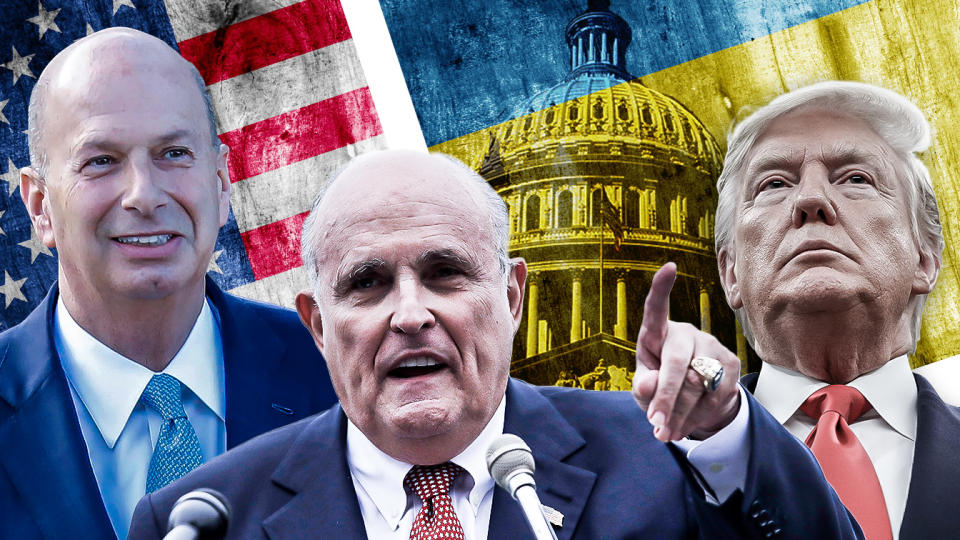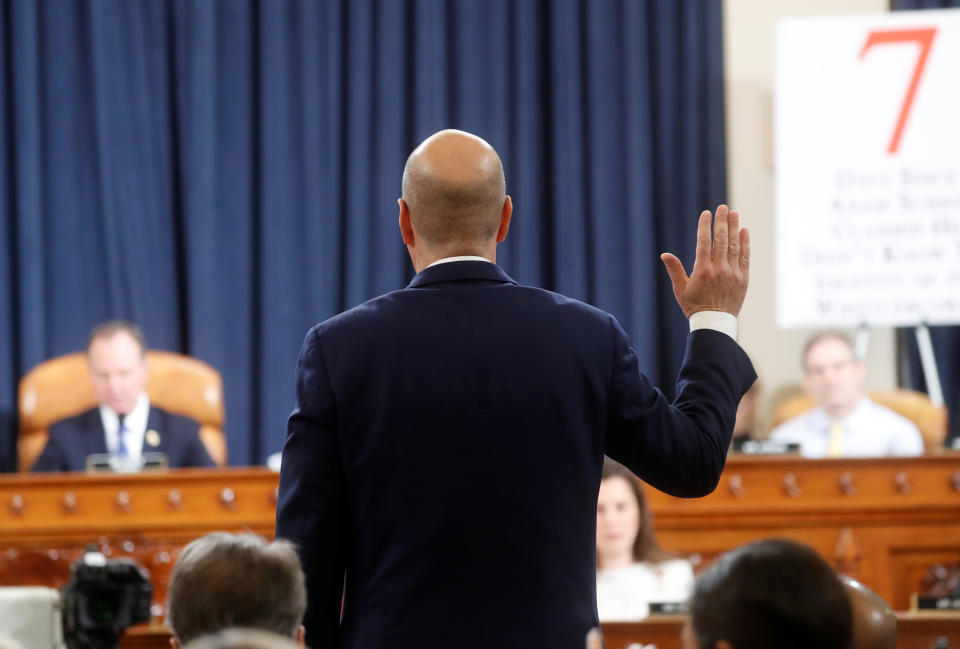Sondland throws Giuliani under a caravan of buses
- Oops!Something went wrong.Please try again later.
- Oops!Something went wrong.Please try again later.
WASHINGTON — In his opening statement before the House Intelligence Committee, Gordon Sondland, the U.S. ambassador to the European Union — who has been widely seen as the impeachment inquiry’s most consequential witness — put President Trump’s personal lawyer Rudy Giuliani at the center of the effort to pressure the president of Ukraine to carry out Trump’s political agenda. His testimony supported the accounts by other witnesses that Trump sought to pressure President Volodymyr Zelensky into announcing an investigation into former Vice President Joe Biden.
That seemed to provide Democrats with what they have been seeking throughout the impeachment inquiry, in particular during its public stage, which began last week: a clear statement tying Trump and Giuliani to efforts of what they describe as bribery and extortion.
“We did not want to work with Mr. Giuliani,” Sondland said. “Simply put, we played the hand we were dealt. We all understood that if we refused to work with Mr. Giuliani, we would lose an important opportunity to cement relations between the United States and Ukraine. So we followed the president’s orders.”
Sondland later said that he was displeased by a May 23 order from the president to effectively hand the Ukraine portfolio to Giuliani. “We weren’t happy with the president’s directive to talk with Rudy. We did not want to involve Mr. Giuliani,” Sondland said. (Ukraine is not in the European Union, though it is a critical ally to the U.S. and many EU nations.)
This was Sondland’s first public testimony, although transcripts of his closed-door questioning have been released. He has amended his version of events, putting distance between himself and Giuliani’s efforts. In the revised opening statement of his deposition, he said that the pressure campaign operated on a “continuum,” but as the summer drew to an end, it became clear that the Ukrainians would not get $250 million in military aid that had been appropriated by Congress.

On Wednesday morning, Sondland made further efforts to distance himself from what has been called the “irregular” channel of diplomacy being operated by Giuliani. Much as Kurt Volker, the former special envoy to Ukraine, did in Tuesday’s testimony, Sondland said he did not initially realize the impropriety of what Giuliani was doing, or the potential illegality of what he is alleged to have asked of Zelensky.
“If I had known of all of Mr. Giuliani’s dealings or of his associations with individuals now under criminal indictment,” Sondland said, according to a version of his opening statement provided to the media, “I would not have acquiesced to his participation. Still, given what we knew at the time, what we were asked to do did not appear to be wrong.”
Sondland’s opening statement appeared intended, in part, to repair his reputation with the media and the Democratic majority on the House Intelligence Committee. Both have treated him with skepticism, and the leading Republican on the committee, Rep. Devin Nunes, warned him at the outset that “you are here to be smeared” by the Democrats.
Sondland began by praising the “integrity, dedication and hard work” of U.S. diplomats — a phrase that seemed intended as a rebuke to Trump and some of his allies, who have described Washington bureaucrats as part of a “deep state” determined to undermine his presidency.
(There is no evidence of the existence of a “deep state,” a term that was coined to describe the state intelligence and military establishment in Turkey, in the United States.)
Sondland also described how his parents fled the Holocaust and how, as a private entrepreneur, he has donated to Democrats and Republicans alike. A $1 million donation to Trump’s 2016 presidential inauguration went unmentioned, though Sondland did say that being named the U.S. ambassador to the European Union was “the highest honor in my public life.”
What followed was a methodical evisceration of Giuliani. “Mr. Giuliani’s requests were a quid pro quo for arranging a White House visit for President Zelensky,” Sondland said, bluntly confirming Democrats’ main contention. In order for Zelensky to gain an Oval Office meeting — which would have been an enormous boost to the credibility of the young and inexperienced Ukrainian leader — he had to announce an investigation into Ukrainian interference in the 2016 presidential election. No such interference is known to have occurred, but it is an article of faith among many right-wing commentators.

Later, the request to Zelensky was amended to include an investigation of Burisma, an energy company whose board members included Hunter Biden, the son of Joe Biden, who is now running for president. The stakes were also raised beyond a White House photo opportunity to include hundreds of millions of dollars in military aid, appropriated by Congress but withheld on orders from the White House.
In a remark that has since become famous, former national security adviser John Bolton denounced that proposed bargain as corrupt, comparing it to a “drug deal.”
Sondland said he never intended for aid to be withheld. “I was adamantly opposed to any suspension of aid, as the Ukrainians needed those funds to fight against Russian aggression,” Sondland said in his opening statement. Part of Ukraine has been occupied by Russia for the last half-decade. “I tried diligently to ask why the aid was suspended, but I never received a clear answer.”
Last week, an impeachment witness testified that Sondland called Trump from a Kyiv restaurant on July 26, the day after Trump’s phone call with Zelensky. On the call, according to testimony from a foreign service officer who overheard both ends of it, Trump pressed Sondland over Zelensky’s intentions regarding the investigations he sought.
In his opening statement, Sondland acknowledged having the discussion — which Trump has said he doesn’t recall “even a little bit” — but said he couldn’t confirm the details of it, because the White House and State Department have apparently denied him access to his notes and records.

Sondland worked vigorously to absolve himself in his opening statement, in preparation for what was certain to be a grueling session of questions from the Intelligence Committee. “I was acting in good faith,” he said. He explained that he worked with Giuliani “not because we liked it, but because it was the only constructive path open to us.” He said that top officials on the National Security Council and at the State Department — including Secretary of State Mike Pompeo, who has tried to stay as far as possible from the impeachment inquiry — were fully apprised of all his activities.
Giuliani, Sondland said, “had been communicating with Ukrainians without our knowledge.”
But if Giuliani was Sondland’s top target, Trump did not escape unscathed. Sondland said that Giuliani’s pressure on the Ukrainians “reflected President Trump’s desires and requirements.” That is precisely the kind of assertion Democrats had been hoping to elicit — and the president’s defenders presumably have been fearing.
Trump has been responding to impeachment witness testimony on Twitter. As of this writing, he has not tweeted about Sondland.
_____
Download the Yahoo News app to customize your experience.
Read more from Yahoo News:
Rebuilding Paradise: A year after the Camp Fire, one couple finds healing in starting over
Key Democrat: House needs to 'keep this simple' in crafting impeachment articles
As Supreme Court weighs DACA, Trump pushes fiction about 'hardened criminals'
PHOTOS: 10 bronze statues of inspirational women in NYC by Statues for Equality"




